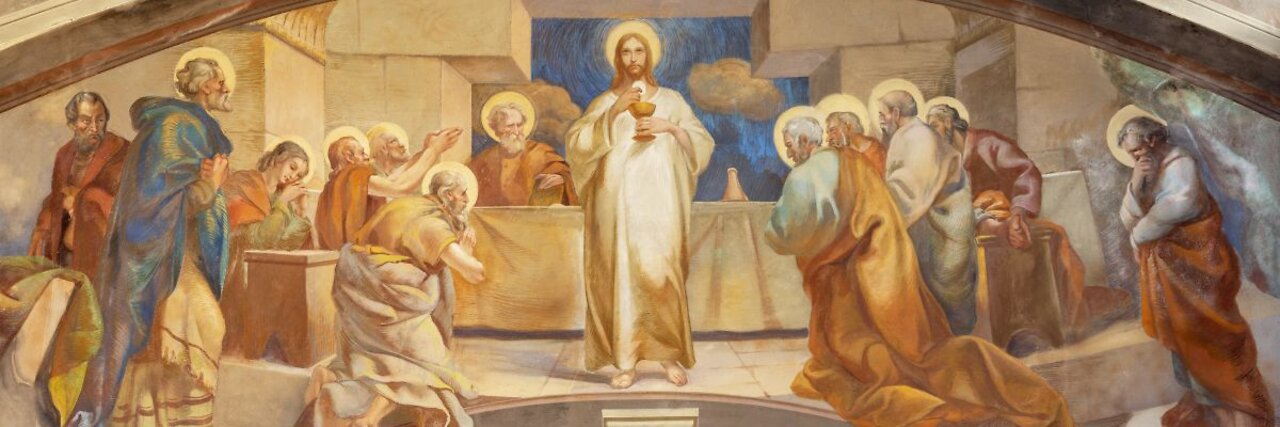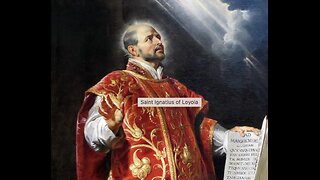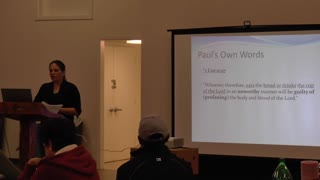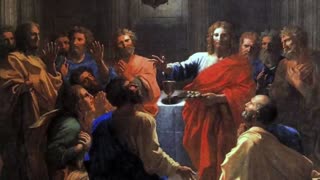Premium Only Content

Eucharist Pre-Constantine Era I
I. Beginning of New Year
- Make Resolutions, spiritual
- Suggested one, be available to the graces offered in the Sacraments esp Baptism & Eucharist
- An excellent way to heighten understanding and appreciation is to consider the Apostolic & Patristic Period
- Study early sources of Christian worship, without filling unavoidable gaps.
By its own nature unitive. Symbolism vs symbol. Sacramental Church absolute importance of physical matter. Can’t easily discount matter. More than external forms of uniformity.
II. Apostolic & Patristic Period, why stop at 311?
- Patristic period extends past Constantine includes Augustine, Athanasius, Chrysostom, and Basil to name but a few of the giants of the Faith. Without whom we would not the rich and articulate Faith we now possess.
- Pre-Constantine is a nod to our ancient roots. Some wrongly suggest that Constantine with Edit of Milan 311 mandated Christianity throughout the Roman Empire. Rather, Constantine stopped the active persecution of Christians by recognizing them. He himself converted at his death bed.
- Vigorous interest in some quarters of Evangelicals recognizing Communion and its efficacy as protection, cause of unity in the body, and a fresh consideration of the words of the Lord.
- The are special words i.e. elements for the wine and bread, as well as the sharing of Communion to those not present. Some of our separated brethren experiencing the salutations effects of Communion, advocate for being a daily communicant.
- I had the privilege of attending a Presbyterian seminary’s reception of the altar, their careful consideration of it, and the blessing of it by (Holy) Water with an asperum.
- Though I stop before the Edit of Milan, I think the words of St. Basil are particularly apropos. Basil mentions the unwritten traditions known to all, such as the sign of the cross, eastward prayer, and the words pronounced over the bread and wine: “As everyone knows, we are not content in the liturgy simply to recite the words recorded by St. Paul and the Gospels, but we add other words both before and after, words of great importance for this mystery. We have received these words from unwritten teaching.”
John everything written down, at that time, could not contain all important things Lord told them. Understanding both taught and written. Hearing is how faith comes by.
Oral tradition recognized as means to hand on important information.
-
 11:24
11:24
Fides et Ratio
8 months agoIgnatius’ Rules for Discernment Journey to God II
45 -
 7:46
7:46
Cafeteria Catholics Come Home
2 years agoThe Eucharist (Aquinas 101)
58 -
 1:23:29
1:23:29
Cafeteria Catholics Come Home
3 years agoRCIA - The Eucharist
36 -
 7:46
7:46
Cafeteria Catholics Come Home
3 years agoThe Eucharist (Aquinas 101)
55 -
 5:45
5:45
Cafeteria Catholics Come Home
3 years agoAnimal Sacrifice and the Eucharist
13 -
 9:32
9:32
jimmyscummings
3 years agoThe Eucharist
38 -
 LIVE
LIVE
Flyover Conservatives
21 hours ago5 Ways to Participate in America’s Financial Revival - Clay Clark | FOC Show
577 watching -
![GrayZone Warfare: NightOp [GAME GIVEAWAY!] - #RumbleGaming](https://1a-1791.com/video/s8/1/s/1/R/D/s1RDv.0kob-small-GrayZone-Warfare-NightOp-GA.jpg) 2:40:46
2:40:46
LumpyPotatoX2
3 hours agoGrayZone Warfare: NightOp [GAME GIVEAWAY!] - #RumbleGaming
26.5K5 -
 2:25:44
2:25:44
WeAreChange
5 hours agoAliens?! Pentagon Shoots Down Iranian Mothership Drone Narrative
61.1K17 -
 59:34
59:34
The StoneZONE with Roger Stone
3 hours agoShould the January 6th Committee be Investigated? | The StoneZONE w/ Roger Stone
22K4